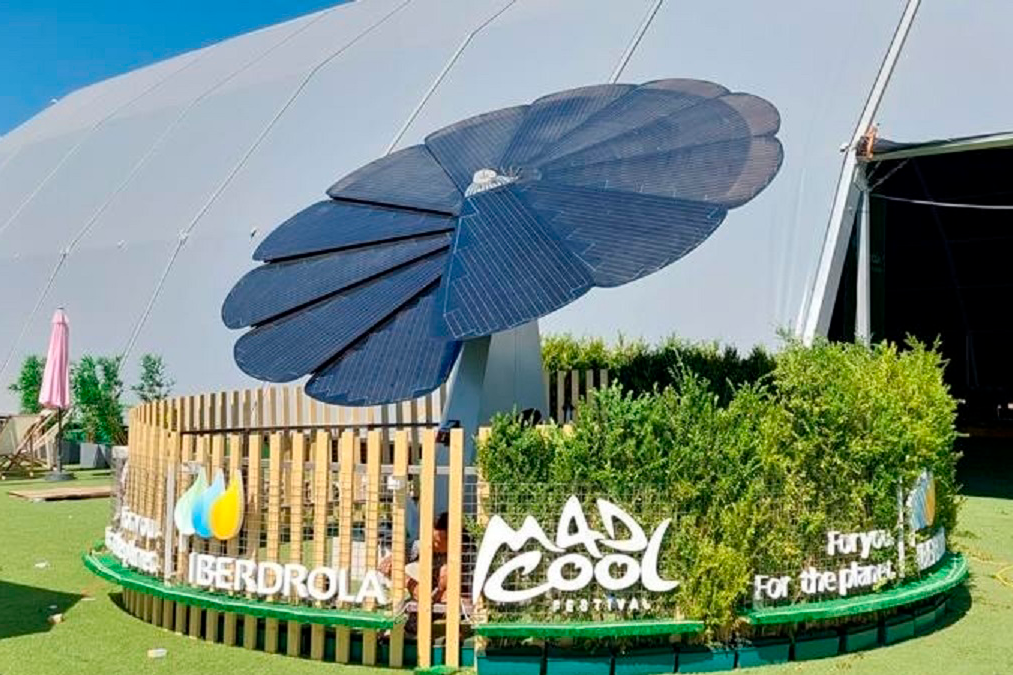News
-
12/07/2022The elite of women's sport cheers on the national football team ahead of their match against Germany A group of seven representatives from different Spanish women's sport federations , a representation of the Spanish sporting elite in various disciplines, visited the players of the Spanish Women's National Football Team in London yesterday. The group of ambassadors, promoted by the Spanish multinational Iberdrola, wanted to show their full support for the Spanish national football team at the top continental event taking place in London, where the national team has already achieved its first victory in the group stage. This afternoon they will face one of the top teams in the European women's football competition, the German national team. The expedition, which has travelled to cheer on the national team in person, is made up of: Gisela Pulido: ten-time VKWC freestyle world champion. Queralt Castellet: silver medallist at the Beijing Olympics 2022 and runner-up at the 2015 World Championships in snowboarding. Paula Arcos: fourth in the world in handball. Sara Hurtado: seven gold medals in ice dance. Silvia Mas: 2021 470 sailing world champion. Desirée Vila: Olympic diploma at the Tokyo Paralympic Games in the long jump and 100m sprint. Carmen Castelucci: young promise of the Spanish rugby team and two-time European champion. "It has been incredible to meet them because we come with a lot of enthusiasm" explained Queralt Castellet. About the group she commented that "it is a team that looks very happy and eager". For her part, the ten times world kitesurfing champion, Gisela Pulido, wanted to send them a message of encouragement telling them to "believe in them because they have an incredible level and they can be there", so she has recommended them to "focus on game by game". Iberdrola, a pioneer in promoting sport for women Promoting women's sports has become a key lever for Iberdrola and for the promotion of real equality between men and women, one of its core values. In 2016, Iberdrola became the first company to make a firm and global commitment to equality and the empowerment of women through sport. The company currently supports 32 federations: gymnastics, triathlon, rugby, canoeing, badminton, football, handball, volleyball, hockey, table tennis, athletics, karate, boxing, surfing, ice sports, fencing, underwater activities, bowling, winter sports, weightlifting, judo, Olympic wrestling, mountaineering and climbing, swimming, skating, pelota, rowing, squash, taekwondo, tennis, archery and sailing. It also gives its name to 32 leagues, all of them at the highest level, and to 100 other competitions with a naming right. This action to support women in the practice of sport has meant that today, in Spain, 2 out of every 3 federated women receive support from Iberdrola. Reducing the gender gap in sport is a commitment to women's equality through excellence and translates into an important reference for girls, from their practice of physical activity and sport at all levels of the education system, to show them that the path to federated and high-performance sport is also possible for them. READ MORE
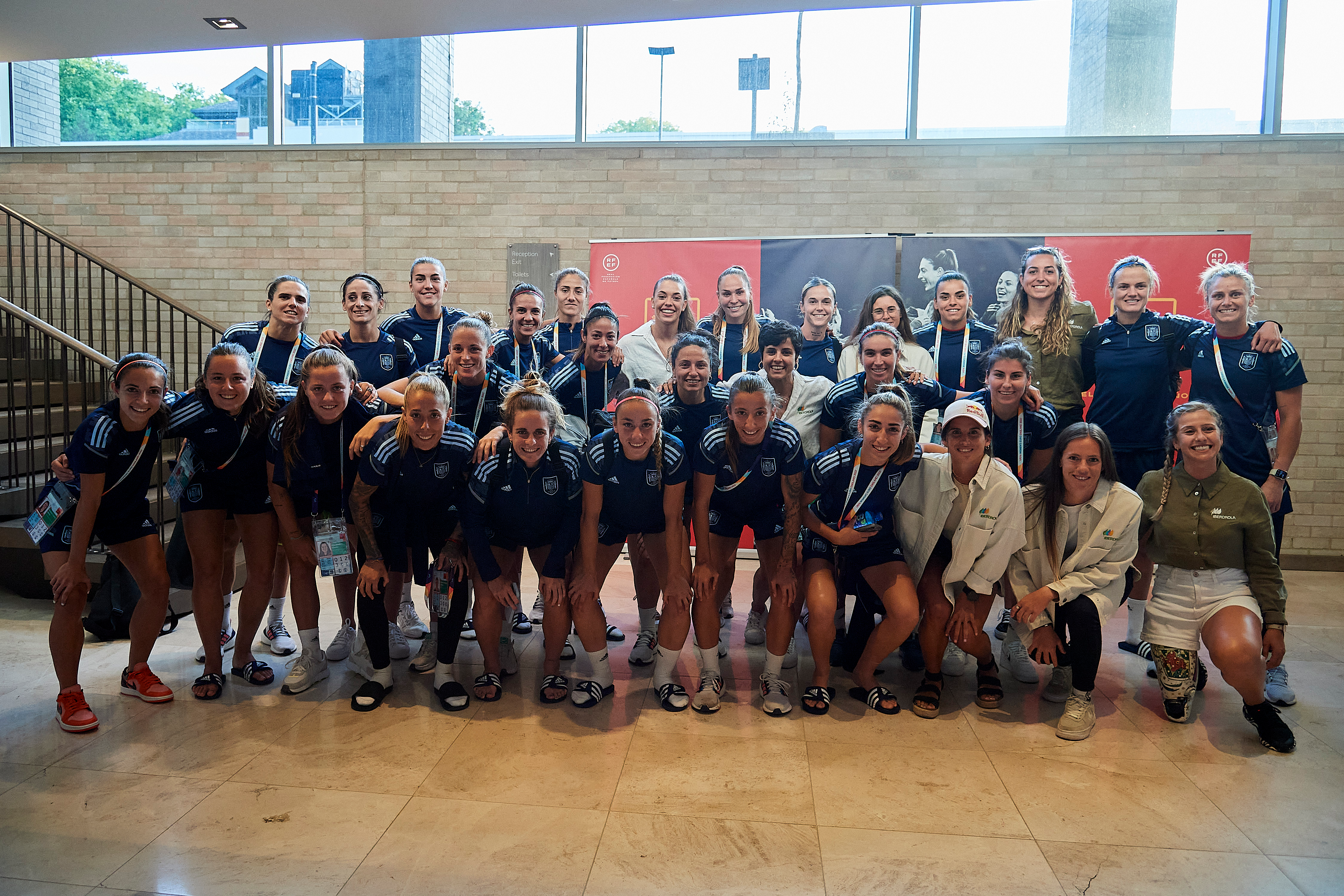
-
12/07/2022PepsiCo teams up with Iberdrola to drive green electricity at all of its sites in Spain and Portugal Iberdrola and PepsiCo have joined forces in their commitment to energy transition and sustainability with the signing of a long-term Power Purchase Agreement (PPA), under which the electricity company will supply 100% renewable electricity to all the beverage and food multinational's centres in Spain and Portugal. It will come into force on 1 January 2023. Specifically, Iberdrola will supply green energy to 11 PepsiCo facilities. These include the production plants in Spain (beverages in Álava, snacks in Burgos and gazpacho Alvalle in Murcia) and another snacks plant in Carregado (Portugal). Also included in the agreement are the two large logistics centres in Burgos and Valencia, as well as sales offices in Vitoria, Pamplona, Palma de Mallorca and offices in Vitoria and Barcelona. This agreement will be effective from 2023. The renewable energy will come from the Francisco Pizarro photovoltaic plant that Iberdrola is developing between the Extremaduran municipalities of Torrecillas de la Tiesa and Aldeacentenera, in Cáceres. The facility, which will soon come into operation, will prevent the emission into the atmosphere of more than 150,000 tonnes of CO2 per year. With 590 megawatts (MW) of installed capacity, the plant will become the largest photovoltaic plant in Europe and will generate the equivalent of the energy needed to supply 334,000 homes per year. This project is part of Iberdrola's ambitious investment strategy in renewable energy generation projects in Spain, as well as its commitment to bilateral contracts as a way to promote the supply of energy at competitive and stable prices among large customers committed to decarbonisation. "We are proud to be part of the development of projects like this that are transforming our country's energy present and future and are fully aligned with our goal to reach net zero emissions by 2040," says Marta Puyuelo, Director of Corporate Affairs and Sustainability for PepsiCo Southwest Europe. She adds, "This is one of many initiatives we are undertaking as part of PepsiCo Positive, our company's comprehensive transformation with sustainability at the core. For his part, Sergio Hernández de Deza, Iberdrola's Director of Large Customers and Industrial Solutions, highlighted that "long-term green power purchase agreements open up many opportunities for the development of renewable projects that allow us to accelerate the energy transition to reduce dependence on fossil fuels. PPAs have become an optimal tool for managing the electricity supply of large consumer customers who share our commitment to a new, cleaner and more sustainable economic model". The alliance between the two companies contributes to promoting sustainable investments in Spain and Portugal through two leading companies in their sector. PepsiCo Positive for a Positive, Emissions-Free Value Chain PepsiCo is committed to redoubling its efforts to reduce greenhouse gas (GHG) emissions by more than 40% by 2030 and achieve net zero emissions by 2040, a decade ahead of the Paris Agreement. Specifically, PepsiCo plans to reduce GHG emissions in its direct operations (Scope 1 and 2) by 75% and in its indirect operations (Scope 3) by 40% by 2030. Together, this action is expected to contribute to a reduction of more than 26 million metric tons of GHG emissions - the equivalent of removing more than five million cars from the road for one year. This initiative is part of PepsiCo Positive , the new sustainability-focused strategy through which the company is accelerating its transformation to promote a positive impact on both the planet and people. pep+ drives action and progress through three key pillars of its business: agriculture, value chain and positive brands. Iberdrola with green energy as the basis for a sustainable economy Iberdrola committed 20 years ago to a sustainable growth strategy based on electrification. The company plans to invest €150 billion by 2030 in renewable energies, electricity grids and energy storage in order to remain at the forefront of the energy revolution. This pioneering commitment has enabled the Iberdrola group to become a global energy leader, with more than 38,300 MW of green power installed, of which 19,300 MW are in Spain (2,200 MW of which are solar). The company aims to achieve carbon neutrality by 2050 and to reduce its global emissions intensity to 50 gCO2/kWh by 2030, having already reached an emissions intensity of 60gCO2/kWh in Europe, thanks to its commitment to the energy transition and the Paris Agreement. READ MORE
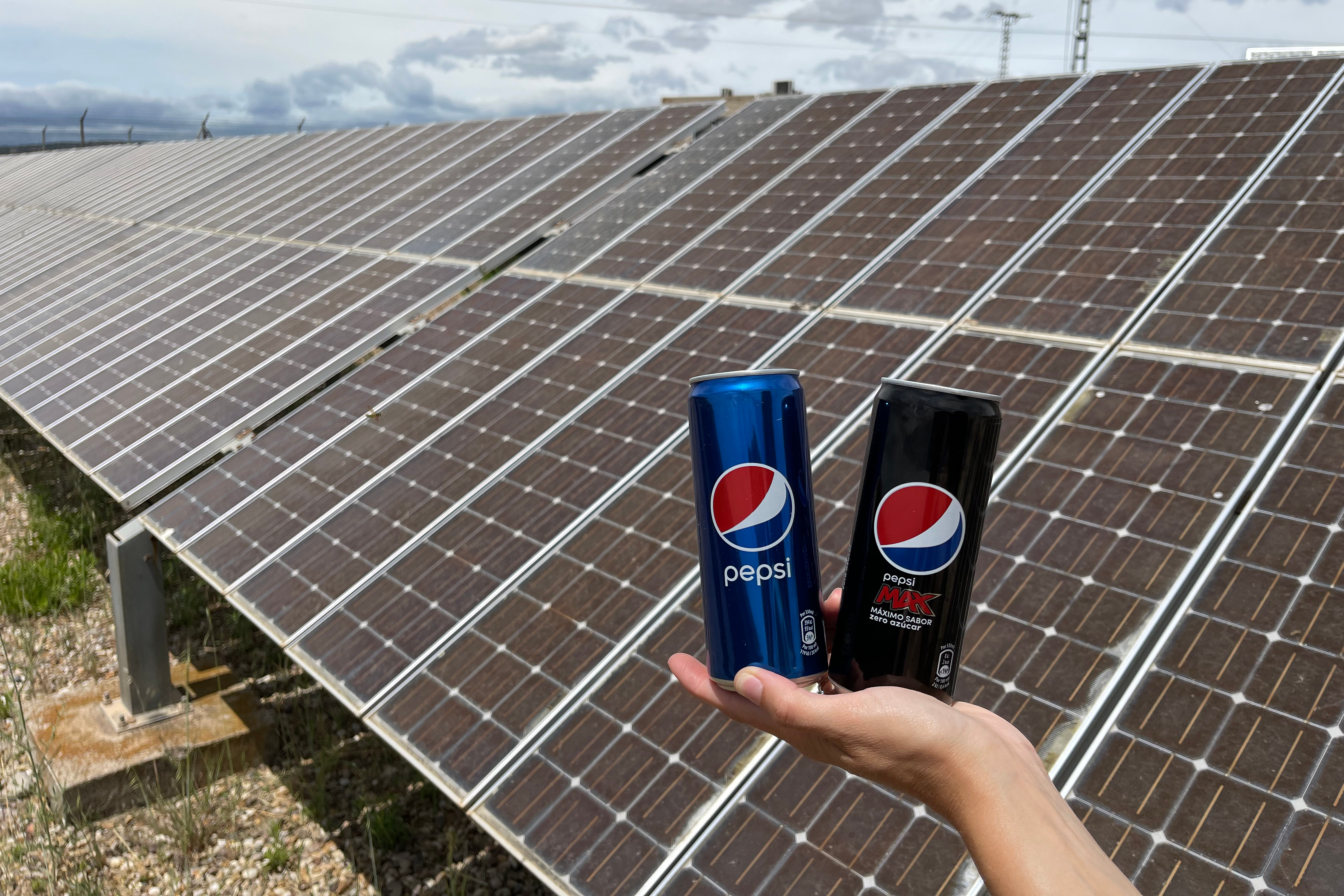
-
12/07/2022Iberdrola Brazil signs a €100 million green loan with the World Bank Iberdrola, through its Brazilian subsidiary Neoenergia , has obtained support from the World Bank to boost its growth strategy, thanks to a green loan of 550 million reais (around 100 million euros). The company will use it to continue its growth strategy in the country. The repayment period is eight years, with a grace period of two years and an interest rate that will be reduced according to various ESG (environmental, social and governance) indicators. The price of the financing, granted by the International Finance Corporation (IFC) - part of the World Bank and the world's largest development institution focused on the private sector in developing countries - is linked to the percentage of women electricians in Neonergia and the reduction of the carbon emissions rate, which will be measured in 2026. If the targets are met, there will be a reduction in the debt spread. The company has informed the Comissão de Valores Mobiliários (CVM), equivalent to the Spanish CNMV, that "the financing agreement reinforces the company's broad access to credit lines at competitive costs and conditions, in line with its strategy of diversifying funding sources to support the development of its business plan". A leader in renewable generation, Neonergia will triple its portfolio of wind assets this year to 1,600 MW, and 90% of total capacity will be green. In the first quarter of 2022, it boosted its investments in renewables in Brazil by 75% to 808 million Brazilian reais (€158 million). Leading electricity grids in Brazil The company is the network leader in Brazil with close to 700,000 kilometres of power lines, thanks to its control of five distribution companies in 18 Brazilian states. In fact, in the last few days the company has been awarded its largest power grid line in the world in the transmission line auction, 1,700 kilometres. It is also a renewable energy giant, with 5,300 megawatts installed, 80% of which are green. It is also one of the country's largest marketers, with 11.2 TWh sold to end customers, with a market share of 18%, after having invested 65 billion reais (around €12.5 billion). The company remains attentive to new opportunities, such as offshore wind and green hydrogen . Through its commitment to the United Nations Sustainable Development Goals (SDGs), the company aims to reduce its CO2 emissions intensity by up to 50% by 2030, with 2007 as the base year. Iberdrola controls 53.4% of Neonergia, which debuted on the Brazilian Stock Exchange in July 2019 and has become one of the largest listed companies on the São Paulo Stock Exchange, as well as one of the mainstays of growth for the company chaired by Ignacio Galán. In recent weeks, Neonergia began trading on BME through Latibex, the Spanish market manager's platform designed to bring companies traded in Latin America closer to European investors. This allows European investors to buy and sell the shares of Iberdrola's Brazilian subsidiary with maximum ease, in euros and with the trading hours of the European markets, and expands its financing capacity and visibility among investors outside Brazil. READ MORE
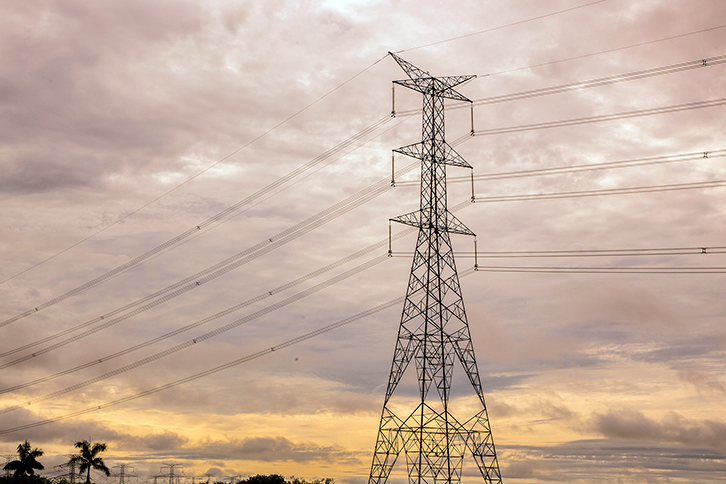
-
11/07/2022Iberdrola starts up its first photovoltaic plant in Italy Iberdrola strengthens its presence in Italy with the construction of its first photovoltaic facility in the country, the 23 MW Montalto di Castro, in the central region of Lazio. The company continues to strengthen its portfolio of projects in Italy and aims to triple them by 2025. Once the assembly of the photovoltaic modules, the construction of the substation and the rest of the electrical infrastructures have been completed, the process of commissioning the plant and connecting it to the grid has begun. When it enters commercial operation, it will supply enough energy to cover the needs of more than 12,000 homes and will prevent the emission of 9,600 tonnes of CO2 into the atmosphere. During the construction phase, archaeological remains dating back to the Etruscan period were found, as well as ceramics, bronze elements and iron weapons. Thanks to the cooperation between Iberdrola and the Archaeology Authority, the materials have been transferred to the National Archaeological Museum of Vulci, one of the most important Etruscan localities in Italy. Iberdrola adds to the 43 facilities under development, totalling 1,500 MW, the signing of a development agreement with the company GreenInvest to develop 17 wind and photovoltaic facilities for a total of 327 MW. The company has also started four other projects totalling 288 MW. Valerio Faccenda, Chairman of Iberdrola Renewables Italy, said: "Iberdrola's mission in Italy is to contribute, with our expertise and financial capacity, to sustainable and ethical investments. The goal is to help Italy out of its dependence on gas and the energy crisis. "Our plan for Italy foresees a significant growth of the renewable workforce with the immediate incorporation of more than 30 professionals. The entire Italian team is called to share Iberdrola's values and to participate in the Group's exciting projects for Italy," he said. Growth in Europe Iberdrola has been active in the Italian market since 2016 as a supplier of green energy to companies and households. The company has developed forward-looking projects, implementing sustainable solutions in order to safeguard the environment for future generations. It is currently considered one of the largest green electricity traders in the country, a leader in the production and distribution of energy from renewable sources. Thanks to its international expansion, the Spanish company has become the leading European energy company in terms of market capitalisation and holds the number one position on the Spanish stock exchange. Focused on renewable energies, smart grids and customer solutions, the company operates 22,000 MW of clean energy and has investments and a presence in 15 European countries, its main markets being Spain, the United Kingdom, Portugal, Germany, Italy, France and Greece. READ MORE
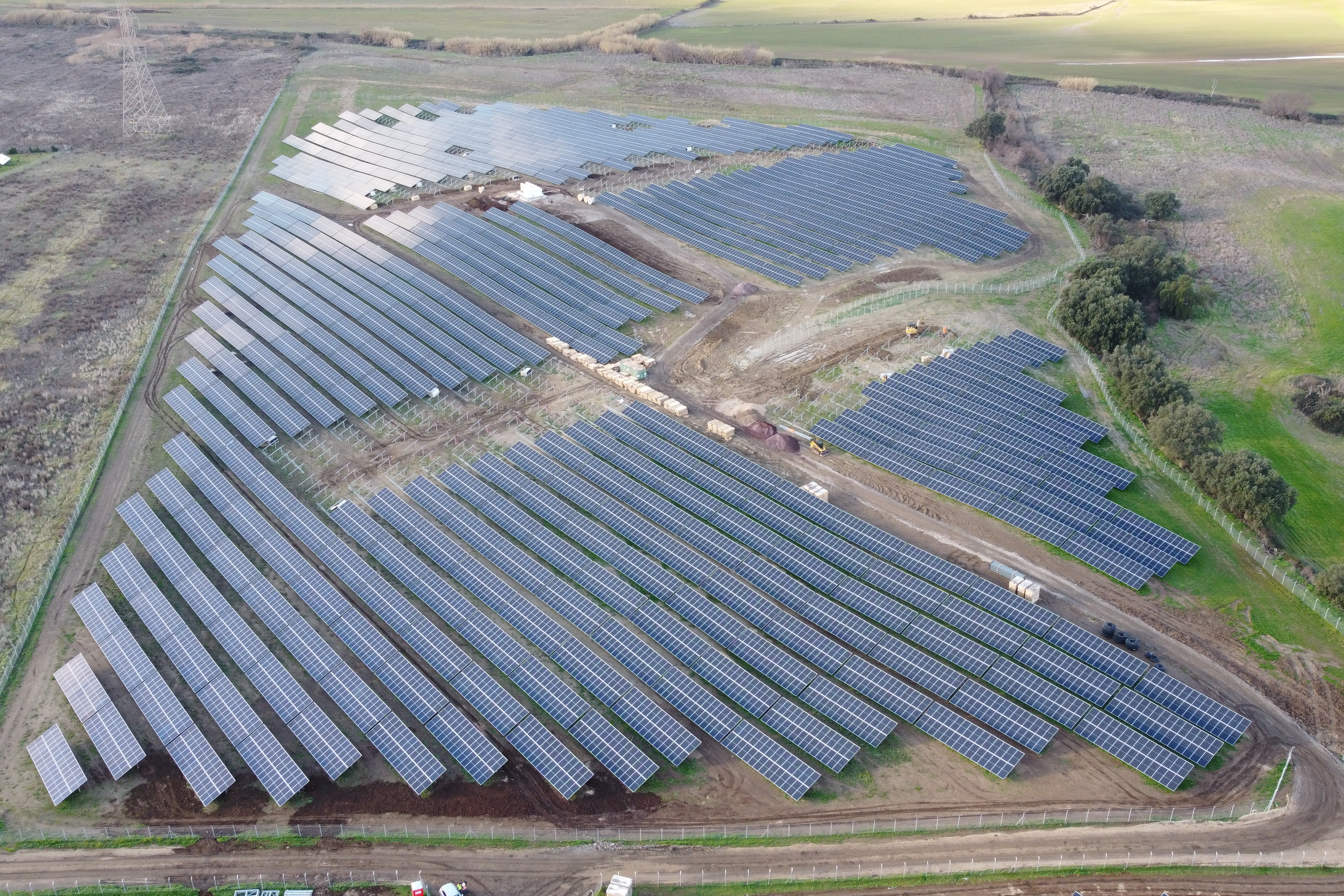
-
08/07/2022Iberdrola installs substation for its first large offshore wind farm in France Iberdrola has successfully completed the offshore installation of the substation for the Saint-Brieuc offshore wind farm in Brittany, France. This infrastructure will be the energy centre of the facility which, once it comes into operation in 2023, will become Iberdrola's first major site of this technology in France, the company's fourth in the world, and the second in operation in France. Weighing some 3,400 tonnes - heavier than 20 Boeing 747 aircraft - this substation will be responsible for collecting all the electricity produced by the plant's 62 wind turbines, estimated at 1,820 GWh/year. The output is enough to supply the needs of 835,000 homes, including heating, and avoid the emission of almost 200,000 tonnes of CO2 per year into the atmosphere. To transfer the electricity generated to land, the company will install 90 kilometres of submarine cable, almost three times the length usually required for an onshore wind farm. All cables between wind turbines will be buried to ensure safe navigation and the maintenance of fishing activities within the wind farm. This electricity distribution infrastructure was built in Belgium by a joint venture comprising Smulders (a subsidiary of Eiffage Metal) and Equans. The former has carried out the engineering and construction of both the foundations and the substation that houses the transformers and other electrical equipment - supplied by GE Renewable Energy Grid Solutions -, while the latter has carried out its assembly and will be responsible for its commissioning. The structure supporting this substation consists of a 63-metre-high jacket foundation weighing 1,630 tonnes. The substation is 55 metres long, 31 metres wide and 23 metres high, with a total weight of approximately 3,400 tonnes. Both elements arrived in the park area at the end of June from the Belgian shipyards of Equans in Hoboken and Heerema Fabrication Group in Vlissingen, where the substation and the foundation have been manufactured, respectively. According to Emmanuel Rollin, head of Iberdrola's offshore business in France, when this facility comes on stream, "the department of Côtes d'Armor, led by the Saint-Brieuc offshore wind farm, will be the leading contributor of renewable energy in Brittany, producing the equivalent of 9% of the region's total electricity consumption". Wind turbine platforms with a Spanish imprint In addition to the installation of the substation, the construction of Saint-Brieuc also continues to progress with the installation of the offshore wind platforms (jackets) built by the Navantia-Windar consortium. So far, 4 platforms have been installed out of the total of 62 that the facility will have. These elements have been manufactured at Navantia-Windar's facilities in Brest and Fene, while the piles that anchor the wind turbines to the seabed have been built at Windar's facilities in Avilés. This project has generated 1,250 direct jobs in Avilés and Fene. In addition, as a result of this contract - valued at €350 million - Navantia-Windar has opened a plant in Brest, France, where the 186 stabbings and intermediate platforms of the transition pieces and the lattice structure for 34 of the 62 structures of the park have been manufactured, generating 250 jobs. The construction of the Saint-Brieuc wind farm will generate more than 1,500 jobs in France, distributed among various companies in the country (including 250 at the Navantia-Windar Brest plant). In total, this means the creation of at least 2,750 jobs between the two countries. The Saint-Brieuc platforms stand on three legs. Each is up to 75 metres high, 25 metres wide and weighs 1,150 tonnes. Iberdrola has used for the first time an innovative hydraulic device called pile grippers to fix these structures, which provides additional fixation and stability during the installation phase, which is expected to begin in the coming months. Iberdrola has already awarded Navantia-Windar contracts worth more than €1 billion, including the award to Windar of the transition parts for the Baltic Eagle offshore wind farms in Germany and Vineyard Wind 1 in the United States, as well as the orders already completed for Wikinger in the Baltic Sea and East Anglia One in the United Kingdom. Furthermore, this collaboration has contributed to making Navantia a global benchmark in the construction of offshore wind components and the leading supplier of this type of structure in France, with one of the greatest development potentials in this industry in Europe. Located some 16 kilometres off the coast, the Saint-Brieuc offshore wind farm will cover an area of 75 square kilometres. Its construction represents an overall investment of nearly 2.5 billion euros. This new facility demonstrates Iberdrola's commitment to the French market, where the company plans to invest around €4 billion by 2025, mainly in renewable projects. Offshore wind energy is one of the keys to Iberdrola's growth. Just as the group was a pioneer in its commitment to onshore wind power two decades ago, the company is leading the development of offshore wind power. READ MORE
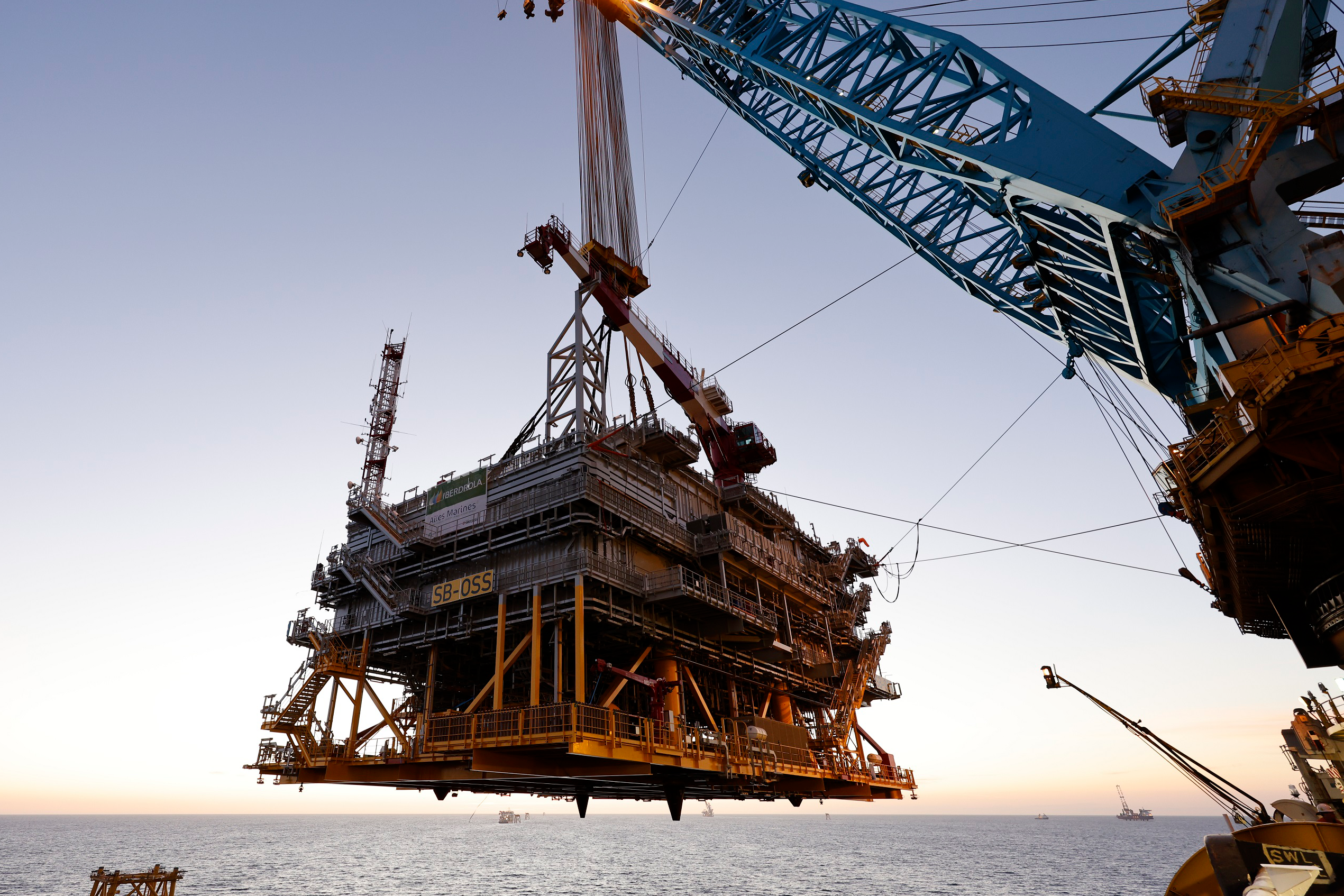
-
07/07/2022Iberdrola to develop 16 new renewable projects in the UK after guaranteeing profitability The Iberdrola group will develop 16 new renewable projects in the UK after guaranteeing their profitability by obtaining Contracts for Difference (CfD) with the UK government that ensure their financial viability. CfDs are a financing mechanism that seeks to incentivise investment in new renewable technologies by guaranteeing developers a fixed indexed price, which allows them to meet initial costs and guarantee a minimum long-term return, regardless of the volatility of the wholesale market. Through ScottishPower, its UK subsidiary, the Iberdrola group has won CfD contracts for its large 1,400 MW East Anglia Three offshore wind project; five onshore wind projects with a combined capacity of 396 MW; and ten solar PV sites with a total capacity of 326 MW. The implementation of these initiatives, which will be carried out in Scotland, England and Wales, will almost double the company's installed renewable capacity in this country, incorporating a total capacity of more than 2,200 MW. Iberdrola has thus become the company with the largest number of renewable projects backed by the UK government in the fourth auction held by the Department of Energy BEIS, the result of which was announced today. The projects selected in this round will have 11,000 MW of installed capacity, of which almost 4,000 MW correspond to offshore wind energy. This decision is an important endorsement for the construction of the East Anglia Three offshore wind farm, which will involve investments of around €4 billion. This site is one of the three offshore projects that form part of the East Anglia Hub, a macro-offshore wind farm complex that will have an installed capacity of 2,900 MW, enough to supply 2.7 million British homes with clean energy, and will involve an investment of approximately 12 billion euros. This infrastructure will be the Iberdrola group's largest offshore wind project in the world. The successful outcome of this latest round of allocations follows Iberdrola's award of 7,000 MW of offshore wind power in Scotland earlier this year in the largest tender to date by the Crown Estate Scotland. In this auction, the company won three large-scale projects, which will involve a total investment of 22,500 million euros: two with floating technology, which it will develop in partnership with Shell, and the third on a fixed structure. Just as the Iberdrola group was a pioneer in the promotion of onshore wind energy more than two decades ago, the company is now leading the development of offshore wind energy, one of the keys to the company's growth, for which it began its commitment 15 years ago. Of the 4,000 MW of wind power currently under construction, more than 2,500 MW (65%) are offshore projects. Among them, Vineyard Wind 1 (806 MW), which will be the first commercial-scale wind farm in the United States. In this country, the group is also promoting Park City Wind (804 MW). In Europe, Iberdrola has two major offshore wind projects under development: Baltic Eagle (476 MW) in Germany - which will form part of the largest offshore wind hub in the Baltic Sea, with 1,100 MW - and Saint-Brieuc (500 MW) in Brittany, France. READ MORE
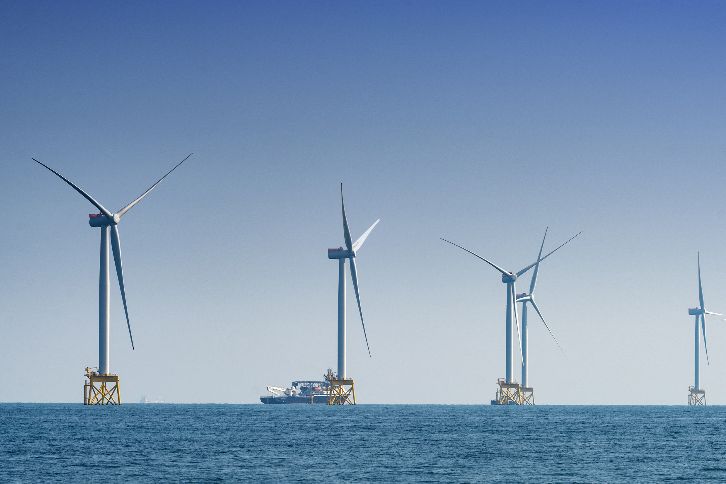
-
06/07/2022Iberdrola to pay 0.274 euros per share as a final dividend Iberdrola Flexible Remuneration' Calendar 7 July 2022 Last day on which Iberdrola shares are traded with the right to participate in the “Iberdrola Flexible Remuneration” optional dividend system, i.e., with the right to opt for one of the options offered by this system. 11 July 2022 Record date for determining the Company's shareholders who will be entitled to participate in the "Iberdrola Flexible Remuneration" system. 21 July 2022 End of the Common Election Period and of the trading period in the market for the free-of-charge allocation rights. 2 August 2022 Payment of the final dividend to those who have opted to receive cash through this option. 3 August 2022 Expected date of commencement of trading of the new shares to be issued pursuant to the capital increase. READ MORE

-
05/07/2022Iberdrola to measure the carbon footprint of the Mad Cool music festival Iberdrola, through its PERSEO Start-ups programme, is taking another step towards sustainability at Mad Cool, one of the leading European music festivals held in Madrid, on its path towards decarbonisation . This project will be implemented by the Spanish start-up GreeMko, Green Management Technology, which has a software solution that helps companies on their way to sustainability and carbon neutrality. Both companies will measure the carbon footprint of the event and raise awareness among attendees about the impact of their travel, in order to take measures to reduce and offset emissions in future editions of Mad Cool. It is estimated that the event, which will be held between 6 and 10 July and of which Iberdrola is a sustainable partner, will be attended by more than 60,000 people per day. Among other things, the carbon footprint associated with the consumption of fuel, electricity and refrigerant gases, as well as the travel of attendees and employees, will be calculated. This will allow the organisation to consult all the data in real time and develop a strategy for reducing and offsetting emissions at future events. Measuring is the first step to becoming carbon neutral. QR codes will be located at strategic locations throughout the event for attendees to complete a mobility survey to instantly calculate the impact of their journeys to the event. In addition, sunflower-shaped solar panels will be located inside the venue, one next to the "The Loop Powered by Iberdrola" stage, contributing 100% clean energy to the energy needed to hold the event. 15 years innovating with start-ups Since its creation in 2008, PERSEO has invested more than 100 million euros in start-ups that develop innovative technologies and business models, focusing on those that improve the sustainability of the energy sector through further electrification and decarbonisation of the economy. The programme has focused its activities on analysing business opportunities and technological collaboration with start-ups and emerging companies around the world, analysing 300 companies each year and creating an ecosystem of almost 7,000 entrepreneurial companies. This investment instrument currently holds a portfolio of eight companies. Through PERSEO, Iberdrola carries out more than 25 real tests of technologies per year, which serve as a first step towards establishing a commercial relationship or partnership with start-ups. In addition, in the last two years the group has launched a total of fourteen challenges in which 700 start-ups have participated. Beyond the financial contribution, PERSEO's support to these companies has been key in defining their product and business, offering them its knowledge and access to Iberdrola's market. On the other hand, the work carried out with the start-ups has served Iberdrola as a technological antenna to find out where their sector is heading. Competitive and sustainable energy and environmental balance Iberdrola has redoubled its efforts to preserve healthy ecosystems as key elements for sustainable growth. In this regard, the group - an international leader in the fight against climate change and a world leader in renewable energies - has set itself the goal of achieving zero net loss of biodiversity by 2030 by focusing, whenever possible, on a positive net impact in new infrastructure developments. As part of this commitment, Iberdrola has announced the planting of more than 20 million trees by 2030. This important commitment, through its Tree Programme, will mean the absorption of more than six million tonnes of carbon dioxide in 30 years and will occupy the surface area of 25,000 football pitches. This absorption of CO2 would neutralise the emissions of a car driving around the Earth 116 times. Iberdrola's Tree Programme is aligned with the Sustainable Development Goals (SDG 15) of the United Nations and the 2030 Agenda. It is part of Iberdrola's commitment to the preservation of ecosystems and biodiversity, as well as to decarbonisation to combat climate change. READ MORE
